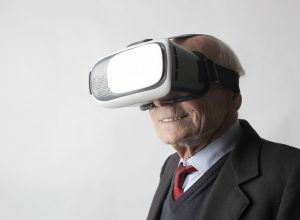Guest Blog: The Future of Rehabilitation: Trends and Predictions
The Future of Rehabilitation: Trends and Predictions
The field of rehabilitation is evolving rapidly. New technologies are bringing about changes in how we practice and treat patients, and there are many ways OTs can be at the forefront of this shift. Here are predictions for what will change in the future of rehabilitation:
The growth of tele rehabilitation
Tele rehabilitation is an increasingly popular method of treating patients who have experienced a traumatic brain injury or stroke. It allows you to work with a therapist from home and can improve your quality of life while reducing costs for the healthcare system overall.
The expanding role of the occupational therapist
As rehabilitation expands, the role of the occupational therapist is also expanding. OTs are becoming more involved in the healthcare system, working with patients who have a variety of conditions and using technology to help them recover from injuries. Even skin specialists are also part of rehab as they give treatment to patients with chronic skin diseases.
As this information becomes more widely available, more people will become aware that they can benefit from occupational therapy services. As a result, we expect demand for occupational therapists to rise significantly over time–especially as baby boomers age and need assistance with daily activities such as cooking or bathing themselves.
The future of homecare
The future of homecare is a topic that has been discussed at length by occupational therapists. While there are many ways to approach this question, one thing is clear: homecare will continue to be an important part of rehabilitation and recovery processes for patients. They can be taken good care from the comfort of their homes by providing medicines, supplements on time and helping them with their recovery process.
Homecare is often characterized by its flexibility and accessibility for patients who need assistance with daily tasks but do not require hospitalization or other intensive treatment options. For example, homehealth services can provide medical equipment such as wheelchairs or mobility aids; occupational therapy services may include help with physical therapy exercises (such as stretching) or assistive technology devices like iPads for communication purposes; speech-language pathology services might include speech therapy exercises for those who have difficulty speaking due to injury or illness; social work services might offer support groups where people go through similar experiences together so they don’t feel alone in their struggles; etcetera! This combination of different types of care allows patients to maintain independence while being cared for by professionals who understand exactly how challenging day-to-day life can be after an injury or illness has affected someone’s ability
How technology will change the way we practice
The future of rehabilitation will be much more efficient and effective, thanks to technology. We’ll be able to diagnose and treat patients remotely, providing them with support whenever they need it. We’ll also be able to collect data on patient outcomes in order to provide better care in the future.
The use of technology to connect patients with their healthcare providers will increase.
As technology continues to advance and become more accessible, it’s likely that patients will have more opportunities to connect with their health care providers. This can help reduce the need for in-person visits, which can be costly for both insurers and patients alike.
The use of technology will also allow patients to receive instructions for exercises and diet plans remotely–which could save money by reducing the need for physical therapy visits or trips to the doctor’s office.
Telemedicine will become more popular, as well as mobile apps.
The use of telemedicine and mobile apps is growing rapidly, especially among people with disabilities.
Telemedicine is a way to get medical care remotely. Mobile apps can be used in the same way as telemedicine, but they’re also useful for things like monitoring your health data or getting reminders about your next appointment (among other things).
Both methods are growing in popularity because they give patients access to specialists who wouldn’t otherwise be available locally; this includes people living in rural areas without access to nearby hospitals or clinics.
Research on muscle stimulation and brain activity will advance.
As more research is conducted on the brain and how it works, new treatments will emerge. The same goes for muscle stimulation, which is a popular treatment option for stroke victims. Research on both has already led to new methods of rehabilitation; combining these two fields of study could lead us even further into the future of rehabilitation.
VR will be integrated into rehabilitation techniques.
Virtual reality (VR) is a great way to motivate patients and help them visualize their recovery. It can also be used to simulate real-world situations, such as walking through the grocery store or navigating crowded sidewalks.
With advancements in technology, VR will become even more immersive and interactive than it already is today. For example, if you’re recovering from surgery on your hip or knee joint and want to see what it would look like when healed properly, a virtual reality simulation could provide an accurate depiction of what that might look like–and show how much better life could be after rehabilitation!
Data analytics will help identify which patients are responding best to a particular treatment plan.
Data analytics will help identify which patients are responding best to a particular treatment plan.
By tracking data from individual patients, doctors can better understand how each person responds to certain medications or therapies, as well as their overall health status. This information is invaluable for improving patient care and ensuring that everyone gets the best possible treatment options based on their specific needs. For example, if you have diabetes and you’re taking medication to manage it, your doctor may want to monitor how much sugar is in your blood at different times throughout the day (or night). If this number creeps up too high or too low without any apparent reason–for example, if you’ve forgotten about taking your pill–the doctor can adjust dosage accordingly so it doesn’t happen again.
An increasing number of people who have been in car accidents or had strokes will seek online support groups from others who have experienced similar injuries.
As more people are able to connect with others who have been through similar experiences, they will be able to find support groups online.
Support groups provide a great way to talk about your feelings and learn from other people who have experienced the same injuries as you. For example, if you were in an accident or had a stroke, you could join an online support group where people who have been through those things can share their stories with each other. It’s easier for most people to open up about personal issues online rather than face-to-face because there’s no pressure or judgment involved when communicating via social media platforms like Facebook Messenger or Reddit threads (or even text messages).
These trends hold great promise for people who need physical therapy and other types of rehabilitation
As technology becomes more and more integral to our lives, it’s no surprise that it will affect the way we practice rehabilitation. Here are some of the most significant trends:
- More patients will be able to connect with their healthcare providers via video chat and other forms of telemedicine. This means that you can meet with your physical therapist or other health professional in person less often, which saves both time and money for both parties involved.
- Mobile apps that make therapy easier to access may become more popular among patients looking for alternatives to traditional treatment options like physical therapy or occupational therapy (OT). These apps allow users to track their progress at home or on-the-go by inputting data into their phones’ sensors–which could lead those who need rehab services but don’t have time for regular appointments with professionals like us here at Fitness & Wellness Center!
Rehab is evolving, and there are lots of opportunities for OTs to be at the forefront.
OTs will be in a good position to help patients get back to their day-to-day lives.
The future of rehabilitation is evolving, and there are lots of opportunities for OTs to be at the forefront. You can help patients recover from injuries or illnesses by helping them get back into their daily routines–whether that’s working out, cooking dinner or just sitting down on the couch with their family after work. This can also include helping them set up home gym equipment or find ways around obstacles if they’re having trouble walking up stairs.
Conclusion
We can’t predict the future, but we can prepare for it. If you’re an OT or PT who’s interested in working with technology, I encourage you to explore these areas and see how they might apply to your practice. You may not be able to use every one of these technologies right away–after all, not everyone has access to VR equipment or telemedicine programs–but they are important tools that can help people recover faster from injuries and illnesses.




